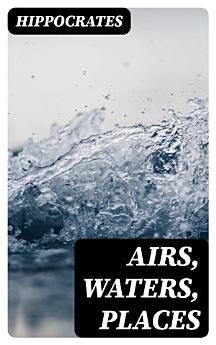关于此电子书
In "Airs, Waters, Places," Hippocrates presents a pioneering treatise on the environmental factors influencing human health, blending observational inquiry with early medical thought. The work is characterized by its empirical approach, examining how varying climates, waters, and geographies affect the health of individuals and communities. This text stands as a seminal piece in the canon of medical literature, revealing the interconnectedness of environment and well-being, while foreshadowing later developments in epidemiology and public health. Hippocrates' style is methodical and persuasive, appealing to both rational thought and empirical observation, making it a foundational text in the medical tradition. Hippocrates, known as the 'Father of Medicine,' was a pivotal figure in shifting medical practices from mystical explanations to rational theories. Living in ancient Greece around the 5th century BCE, Hippocrates was influenced by a rich intellectual tradition and the Socratic method of inquiry. His desire to understand the human body and its ailments was propelled not only by personal curiosity but also by the practical need to treat patients in a more effective manner, reflecting the ethos of his time. This compelling work is highly recommended for readers interested in the historical roots of medicine and the continuing relevance of environmental health. "Airs, Waters, Places" offers profound insights and lays the groundwork for understanding health in the context of geography and climate—concepts that are increasingly pertinent in today's world.
作者简介
Hippocrates, often revered as the 'Father of Western Medicine,' was a seminal figure in the development of medical practice and philosophy in the classical world. Born on the Greek island of Kos around 460 BCE, he became the most celebrated physician of his time. Although direct historical records from his life are scarce, his contributions have left an indelible mark on the field of medicine. A noteworthy work attributed to Hippocrates is 'Airs, Waters, Places,' which examines environmental and lifestyle factors in relation to health and disease, proposing that one's surroundings can influence their well-being. This text is instrumental in the shift of medicine from a more superstitious practice to one predicated on observation and logical reasoning. Hippocratic thought was dominated by a belief in the natural healing process of rest, diet, exercise, and fresh air. As the reputed author of the Hippocratic Corpus, a collection of around 70 medical works of varying authenticity, his influence extends to the eponymous Hippocratic Oath, an ethical framework still in use today. Scholarly debate continues on the exact writings by Hippocrates, as many of the texts within the Corpus are considered to be the work of his followers and later interpreters who codified his teachings and practices. Despite this, Hippocrates' standing as a key historical figure in the transition to systematic and rational medical practice remains uncontested.
为此电子书评分
欢迎向我们提供反馈意见。
如何阅读
智能手机和平板电脑
笔记本电脑和台式机
您可以使用计算机的网络浏览器聆听您在 Google Play 购买的有声读物。
电子阅读器和其他设备
如果要在 Kobo 电子阅读器等电子墨水屏设备上阅读,您需要下载一个文件,并将其传输到相应设备上。若要将文件传输到受支持的电子阅读器上,请按帮助中心内的详细说明操作。








